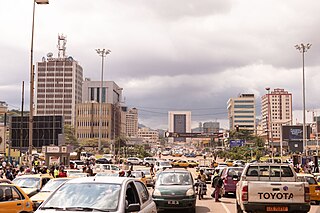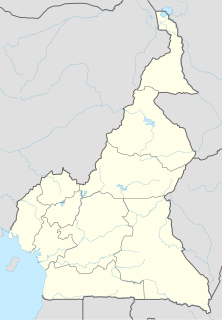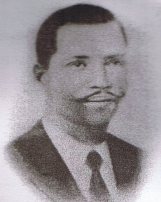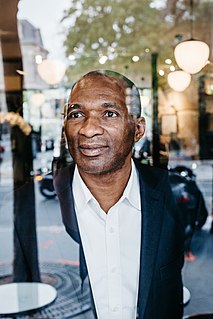
Yaoundé is the capital of Cameroon and, with a population of more than 2.8 million, the second-largest city in the country after the port city Douala. It lies in the Centre Region of the nation at an elevation of about 750 metres (2,500 ft) above sea level.

Paul Biya is a Cameroonian politician serving as the President of Cameroon since 6 November 1982.

The Centre Region occupies 69,000 km² of the central plains of the Republic of Cameroon. It is bordered to the north by the Adamawa Region, to the south by the South Region, to the east by the East Region, and to the West by the Littoral and West Regions. It is the second largest of Cameroon's regions in land area. Major ethnic groups include the Bassa, Ewondo, and Vute.
The Beti-Pahuin are a Bantu ethnic group located in rain forest regions of Cameroon, Republic of the Congo, Equatorial Guinea, Gabon, and São Tomé and Príncipe. Though they separate themselves into several individual clans, they all share a common origin, history and culture.
Articles related to Cameroon include:

Charles Atangana, also known by his birth name, Ntsama, and his German name, Karl, was the paramount chief of the Ewondo and Bane ethnic groups during much of the colonial period in Cameroon. Although from an unremarkable background, Atangana's loyalty and friendship with colonial priests and administrators secured him successively more prominent posts in the colonial government. He proved himself an intelligent and diplomatic administrator and an eager collaborator, and he was eventually named paramount chief of two Beti-Pahuin subgroups, the Ewondo and Bane peoples. His loyalty and acquiescence to the German Empire was unquestioning, and he even accompanied the Germans on their escape from Africa in World War I.

Martin-Paul Samba, born Mebenga m'Ebono, was a Bulu military officer during the Imperial German colonial period of Cameroon. M'Ebono became a favourite of the German colonials during his upbringing in Kribi, a coastal settlement in southern Cameroon. He was sent to Germany in 1891 to enter the German Military Academy; he was baptised Martin-Paul Samba while abroad. Upon graduation, Samba returned to Cameroon and accompanied German military expeditions across the colony.
Ewondo or Kolo is the language of the Ewondo people of Cameroon. The language had 577,700 native speakers in 1982. Ewondo is a trade language. Dialects include Badjia (Bakjo), Bafeuk, Bamvele, Bane, Beti, Enoah, Evouzok, Fong, Mbida-Bani, Mvete, Mvog-Niengue, Omvang, Yabekolo (Yebekolo), Yabeka, and Yabekanga. Ewondo speakers live primarily in Cameroon's Centre Region and the northern part of the Océan division in the South Region.

Mvolyé or Mvolye is a neighbourhood of Yaoundé, Cameroon. Around 1900, during Cameroon's colonial period, the site was part of the lands ruled by Karl Atangana. Atangana donated part of the area to the German Pallottine Fathers, a Roman Catholic missionary group. The Ewondo people had previously been unable to settle it due to a large rock there. The Fathers built a permanent mission, which opened Central and Eastern Cameroon to Christianisation. Atangana remained chief of the area.
Omgba Bissogo(c. 1855 – 1896) was an Ewondo tribal chief and warrior who, during the colonial period in Cameroon in 1895, led a rebellion against German forces present in Cameroon. Omgba Bissogo was the head of the Ewondo Mvog Ottou sublineage. Bissogo and his army won their initial battles against the Germans.This was the first German defeat on Cameroonian soil. However, the Germans responded with a brutal strike against the Mvog Ottou tribe even committing crimes against civilians. Bissogo was betrayed and arrested thanks to one of his numerous wives who revealed his cache to the Germans. He was immediately put in Jail in the German station in Jaunde and beheaded. This defeat and the brutality of the German response would later have a great impact on the future Powermount Chief of the Ewondo and Bene Charles Atangana who in his book Jaunde Texte talks about the fallen Hero. Even today the tales praising Omgba bissogos fierness and courage against the German invaders are part of the beti folklore.
Jaunde-Texte von Karl Atangana und Paul Messi is a book written by Karl Atangana and Paul Messi and edited by linguist Martin Heppe. Atangana compiled the book while living in Hamburg, Germany, from 1911 to 1913. It consists of his letters and of the folklore and oral history he had learned as a young Ewondo boy in Africa prior to the establishment of the German Kamerun colony. It was published in Hamburg in 1919. Today, the Jaunde-Texte is an important source on the early history of the Ewondo and related peoples.
Marie-Thérèse Assiga Ahanda was a Cameroonian novelist, chemist, and paramount chief of the Ewondo and Bene people. Early in life, Ahanda worked for the chemistry department of the University of Yaoundé. She later moved to the Republic of the Congo with her husband, Jean Baptiste Assiga Ahanda, and took to writing. When they returned to Cameroon, Ahanda became an elected delegate in the National Assembly of Cameroon, a position she held from 1983 to 1988. Ahanda became the Ewondo paramount chief in 1999. In December 2000, she began renovating her father's palace at Efoulan, Yaoundé, a project that costed an estimated 150,000,000 francs CFA. Ahanda is the daughter of Charles Atangana—paramount chief of the Ewondo and Bene peoples under the German and French colonial regimes—by his second wife, Julienne Ngonoa.

Rudolf Duala Manga Bell was a Duala king and resistance leader in the German colony of Kamerun (Cameroon). After being educated in both Kamerun and Europe, he succeeded his father Manga Ndumbe Bell on 2 September 1908, styling himself after European rulers, and generally supporting the colonial German authorities. He was quite wealthy and educated, although his father left him a substantial debt.
Simon Pierre Mvondo Atangana is a Cameroonian former footballer who played as a forward for a number of clubs across multiple countries. His career began in native Cameroon, playing for Olympic Mvolyé and Tonnerre Yaoundé with a spell in Saudi Arabia with Al-Fateh separating the two stints. He earned a move to Scotland, signing for Dundee United in 2000. He went out on loan to English club Port Vale in 2002. Upon leaving Dundee, Atangana joined Colchester United, before moving to English non-league clubs Grays Athletic and Halstead Town. He later played in eastern Europe for Luch-Energiya and Terek Grozny in Russia and Lokomotiv Minsk in Belarus. He retired in 2006, returning from retirement in 2010 to play for French club CO Saint-Dizier.
The Sso was an initiation rite practiced by the Beti of Cameroon in the 19th and early 20th centuries. The participants were young men between 15 and 25 years of age who, by completing the rite, became adults and enjoyed added privileges, such as passage into land of the ancestors at death. Each boy was sponsored by an esia Sso. The sponsor of the rite was a village headman; he was expected to provide food and lodging for guests and to pay for several large feasts during the rite's six-month duration. Other important figures were the zum loa, who revealed past sins that the sponsor had committed and which would be expiated by the rite's completion, and the mfek Sso, who organised and administered the rite.

French Cameroons, or Cameroun, was a League of Nations Mandate territory in Central Africa. It now forms part of the independent country of Cameroon.

Michel Thierry Atangana is a French citizen of Cameroonian origin who was imprisoned in Yaoundé, Cameroon from 1997 until 2014. International human rights organisations delared him a political prisoner, held for support of potential presidential candidate Titus Edzoa. Atagana was released in 2014 by presidential decree.

Conrat Frederic Atangana is a Paralympian from Cameroon who represented his country at the 2012 Summer Paralympics in powerlifting's men's -56 kg event.
The following is a timeline of the history of the city of Yaoundé, Cameroon.











